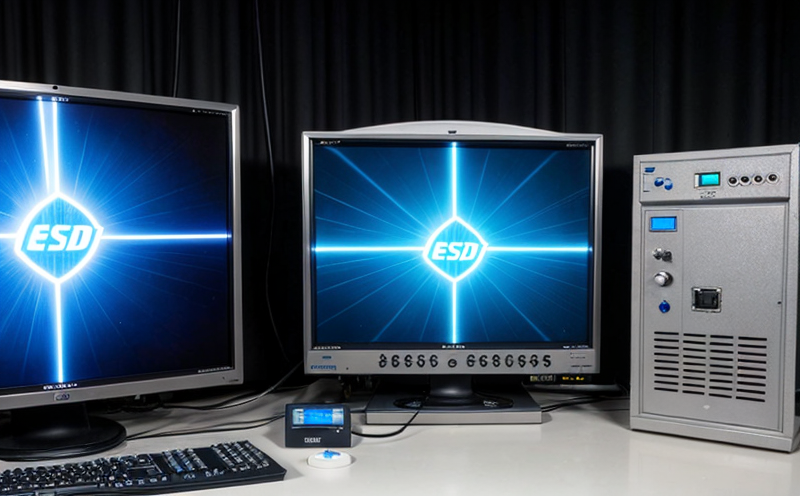IEC 61000-4-38 Radiated Immunity Under Harsh Environments Testing
The International Electrotechnical Commission (IEC) has established a series of standards that provide guidelines for ensuring the robustness and reliability of electrical and electronic products under various environmental conditions. Among these, IEC 61000-4-38 focuses on radiated immunity testing in harsh environments. This standard is crucial for semiconductor and microchip manufacturers as it ensures that their devices can withstand electromagnetic interference (EMI) without malfunctioning or failing.
The test evaluates the ability of electronic components to function properly when subjected to specific levels of electromagnetic fields, which are often generated by other electronic devices in industrial settings. This is particularly important for semiconductor and microchip manufacturers who aim to produce robust products that can operate reliably under real-world conditions. The standard covers a wide range of environments including those found in manufacturing plants, hospitals, and other industrial facilities.
The test involves exposing the specimen to controlled levels of electromagnetic radiation, typically at frequencies between 80 MHz and 1 GHz, which are common in industrial environments. The specimen is placed in an anechoic chamber where it is subjected to a series of radiated fields that simulate real-world conditions. These conditions include static, intermittent, and continuous signals, as well as different levels of field strength.
The testing process is designed to replicate the harsh electromagnetic environment that semiconductor and microchip products may encounter in their operational environments. The test aims to ensure that devices can maintain functionality under these challenging conditions without any degradation or failure. This is achieved by subjecting the specimen to a series of predefined tests, each designed to simulate specific types of interference.
The standard specifies detailed procedures for setting up and conducting the tests, including the use of specialized equipment such as high-frequency generators and measurement instruments capable of accurately measuring electromagnetic fields. The testing process is highly regulated to ensure consistency and reliability across different laboratories and test facilities. This ensures that results are comparable and can be relied upon by manufacturers and regulatory bodies.
IEC 61000-4-38 radiated immunity tests are essential for ensuring the robustness of semiconductor and microchip products in harsh environments. The standard provides a framework for testing that helps manufacturers develop products capable of withstanding electromagnetic interference, which is critical for their reliability and performance.
Why It Matters
The importance of IEC 61000-4-38 radiated immunity tests cannot be overstressed. In today's interconnected world, electromagnetic interference (EMI) is a significant concern for the reliable operation of electronic devices. The standard ensures that semiconductor and microchip products can function properly in environments where they are likely to encounter EMI.
Harsh industrial settings, such as manufacturing plants and hospitals, often generate high levels of electromagnetic radiation due to the presence of various electrical and electronic equipment. If semiconductor or microchip devices fail to withstand these conditions, it could lead to operational disruptions, increased maintenance costs, and potential safety hazards.
The robustness of a product's design is directly correlated with its performance in real-world applications. By adhering to IEC 61000-4-38 standards during the development phase, manufacturers can ensure that their products are not only reliable but also capable of maintaining performance under challenging conditions.
Why Choose This Test
- Ensures compliance with international standards for electromagnetic interference testing
- Provides a robust framework for evaluating the reliability and performance of semiconductor devices in harsh environments
- Helps identify potential issues early in the development process, reducing costly reworks
- Facilitates smoother regulatory approvals by meeting stringent international standards
- Ensures that products perform consistently across different environmental conditions
- Promotes the use of high-quality components and materials through rigorous testing protocols
Competitive Advantage and Market Impact
The ability to demonstrate compliance with international standards like IEC 61000-4-38 is a significant competitive advantage in the semiconductor industry. It not only ensures that products are reliable and robust but also opens doors to new markets and opportunities.
By ensuring that their products meet these stringent testing requirements, manufacturers can differentiate themselves from competitors who may not adhere to such standards. This can lead to increased market share and customer confidence, as buyers are more likely to choose products that have been rigorously tested and proven reliable.
The impact of this compliance extends beyond just the immediate market; it also contributes to a company's reputation for quality and innovation. Potential investors and partners are more inclined to support companies with a strong track record of adhering to international standards, further enhancing their competitive edge.





